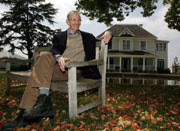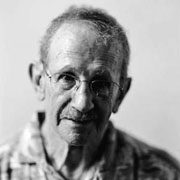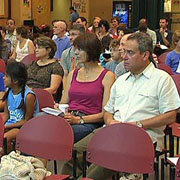VOA慢速英语2011--Cohousing Community Offers Washington Homeowners Modern Village Living
搜索关注在线英语听力室公众号:tingroom,领取免费英语资料大礼包。
(单词翻译)
THIS IS AMERICA - Cohousing Community Offers Washington Homeowners Modern Village Living
BARBARA KLEIN: Welcome to THIS IS AMERICA in VOA Special English. I’m Barbara Klein.
STEVE EMBER: And I’m Steve Ember. This week on our program, we visit a small community built on the idea known as cohousing. We also hear from the nation's new poet laureate. And we look at interfaith marriage in the United States.
(MUSIC)
BARBARA KLEIN: There are more than one hundred fifty cohousing communities across the United States. One of them is Takoma Village Cohousing here in Washington. The development has forty-three units of attached housing, in buildings grouped around a shared open space. About sixty adults and twenty-two children currently1 live there.
The units are individually owned. The residents share a common building with a children's playroom, study room and laundry machines. It also has a kitchen and a large area where the residents eat meals together several times a week.
Sharon Villines was one of the first people to move into Takoma Village Cohousing when it opened in two thousand.
 |
| Phillip Levine |
SHARON VILLINES: “What I like most is I know all my neighbors. It’s just like this big, extended family."
STEVE EMBER: In some ways it seems like an old-fashioned village where everyone knows everyone else.
SHARON VILLINES: “There is a Monday night group that consists of thirty, forty people. Two or three people would cook each week and serve other people. We have lots of potlucks, where people bring things. That works very well.”
The residents are from different generations and ethnic2 groups.
ABE HUSSEIN: "For me, the most important advantage for cohousing is diversity.”
Abe Hussein and his wife moved to Takoma Village six years ago. They used to live in New York state in a house with four bedrooms and even a swimming pool indoors.
ABE HUSSEIN: “One good thing about cohousing is it’s also a great place for raising kids. The children here, they don’t have any strangers because they see their neighbors every day or every week.”
BARBARA KLEIN: Ann Zabaldo also lives in Takoma Village.
ANN ZABALDO: “We have a group of about four or five people who as part of what we call work share, or their part of the contribution to the community is every two weeks they clean the common house. We have a specific person who cleans the bathrooms, and, in between, people are expected to pick up after themselves when they use the common house.”
Neighbors shape life inside their community through their imagination and participation3. But Abe Hussein says not everyone seems interested in sharing the work.
ABE HUSSEIN: “One of the areas I have a lot of troubles with is work share. The assumption4 here is that everyone will do some work, and most of the people do, but there are a few people who don’t.”
STEVE EMBER: Charles Durrett and his wife, Kathryn McCamant, helped bring the idea of cohousing to the United States.
KATHRYN McCAMANT: "My husband and I were young architects studying in Denmark when we came across this idea. It really intrigued5 us both on a personal and a professional level."
They wrote about it in a nineteen eighty-eight book called "Cohousing." They recently published a second book, "Creating Cohousing."
KATHRYN McCAMANT: “It’s the oldest idea about how people lived together. I think what we did was sort of take the Danish model and adapt it to an American model, to our crazy, modern twenty-first century lives.”
BARBARA KLEIN: Kathryn McCamant says cohousing is about creating a better quality of life. She says cohousing also makes sense for economic and environmental reasons.
KATHRYN McCAMANT: “We have chosen to live in smaller houses with more community facilities and very energy-efficient houses. We live more sustainably, we use less of the earth resources, less energy and drive less.”
(MUSIC)
STEVE EMBER: America’s new poet laureate is Philip Levine. He is eighty-three years old and was born in Detroit, Michigan. Many of his poems celebrate the nation's industrial past and the struggle of working people. He was a factory worker in Detroit in the nineteen forties and fifties.
 |
| US Poet Laureate Philip Levine draws on his own past as a factory worker in his poems. |
PHILIP LEVINE: “I remember when I worked at General Motors, sometimes people would come in being led on a tour. They were looking at us like we are in the zoo. I felt demeaned by it. I also felt I am a smart guy. I am not living on my wits. And I’ve got to figure out a way to live on my wits because my back is getting tired. And I did finally get out of it. I got out of it by publishing poetry.”
Mr. Levine’s subject matter has new meaning in today’s difficult economy. His poem “What Work Is” was the title work of a collection that won him the National Book Award.
PHILIP LEVINE:
We stand in the rain in a long line
waiting at Ford7 Highland8 Park. For work.
You know what work is--if you're
old enough to read this you know what
work is, although you may not do it.
Forget you. This is about waiting ...
Mr. Levine and his wife of nearly sixty years, Frances, have an apartment in Brooklyn, New York. But they often stay at their home in Fresno, California, about two hundred fifty kilometers from the Pacific coast. In Fresno he writes a different sort of poetry. Here is an excerpt9 from his poem “Our Valley.”
PHILIP LEVINE:
We don't see the ocean, not ever, but in July and August
when the worst heat seems to rise from the hard clay
of this valley, you could be walking through a fig6 orchard10
when suddenly the wind cools and for a moment
you get a whiff of salt, and in that moment you can almost
believe something is waiting beyond the Pacheco Pass,
something massive11, irrational12, and so powerful even
the mountains that rise east of here have no word for it.
BARBARA KLEIN: Mr. Levine values silence. He even celebrates it in his poem called “He Would Never Use One Word Where None Would Do.” Here is poetry reader Allan Lokos reading from that poem.
READER:
Fact is, silence is the perfect water:
unlike rain it falls from no clouds
to wash our minds, to ease our tired eyes,
to give heart to the thin blades of grass
fighting through the concrete for even air
dirtied by our endless stream of words.
Philip Levine won a nineteen ninety-five Pulitzer Prize for his collection "The Simple Truth." These lines, read by Allan Lokos, are from the title poem.
READER:
Can you taste
what I'm saying? It is onions or potatoes, a pinch
of simple salt, the wealth of melting butter, it is obvious,
it stays in the back of your throat like a truth
you never uttered because the time was always wrong
STEVE EMBER: The librarian of Congress, James Billington, appointed Philip Levine to follow W.S. Merwin as poet laureate. In that position, Mr. Levine says he will do what he does when he writes a poem. He will not know where it is going; he will just follow his instincts.
(MUSIC)
BARBARA KLEIN: A study has estimated that between one-third and one-half of all marriages in the United States are between people of different faiths. Jews are marrying outside their religion faster than members of other faiths.
 |
| An interfaith meeting in a high school in Kensington, Maryland |
But some interfaith couples say they want to be true to both Christian13 and Jewish traditions. More than one hundred families are members of the Interfaith Families Project. They meet Sunday mornings at a high school in Kensington, Maryland, near Washington.
They have Jewish prayers ...
CONGREGATION: "Baruch shem kevod malkhuto le-olam va-ed"
and Christian prayers ...
CONGREGATION: "Thy Kingdom come, Thy will be done, on Earth as it is in Heaven."
and some things that belong to neither tradition -- like singing a Beatles song.
CONGREGATION: ("When I'm Sixty-four")
Then their children go into classrooms to learn about both Christianity and Judaism.
TEACHER: “What do you see?”
CHILD: “A star in the middle of an apple!”
The teacher is Cindy Porhoryles. She is Roman Catholic14. Her husband is Jewish.
CINDY PORHORYLES: “We really try to honor both traditions, both sets of rituals15 if you want to call it that, and the foundation of both religions.”
BARBARA KLEIN: Critics say there are limits to combining traditions -- after all, Jews do not share the Christian belief that Jesus is the son of God. At the same time, many parents in the Interfaith Families Project say they worry that their children will not be accepted by either religion.
Angela Whitehead Quigley was raised Catholic. Her husband, David Quigley, is Jewish. They met in college.
ANGELA WHITEHEAD QUIGLEY: “Neither one of us was going to convert16. We both felt very strongly about our own faiths, and so we were really trying to find a place where we felt home and that’s what we found here."
DAVID QUIGLEY: “Part of what I loved about her from day one was her Christianity. I assume part of what she loved about me from day one was the faith I had, the Jewish background.”
STEVE EMBER: Theology professor Chester Gillis at Georgetown University in Washington is writing a book. He hopes it will show interfaith couples how they can live with different beliefs in God.
CHESTER GILLIS: “If you marry someone from your own community, there’s a common sympathy and understanding, tradition, a culture, social events, that you’re just familiar with. When you marry outside of that you may not be familiar with those at all. It may be your first time celebrating Easter, or your first time celebrating Passover, or your first time celebrating Eid."
BARBARA KLEIN: Two researchers, David Campbell at the University of Notre Dame17 and Robert Putnam at Harvard, published a study last year. They found that one-third to one-half of all marriages in the United States are interfaith. That could involve for example, marriages between Catholics and Protestants.
Recent waves of immigration have brought new groups of Muslims, Hindus, Buddhists18 and others into society. Americans are increasingly socializing with people outside their own faiths.
The United States is sometimes described as the world's most religiously diverse nation. Religious leaders are under pressure to be more accepting of interfaith couples. Professor Gillis says the biggest challenge so far has been for Jews.
CHESTER GILLIS: “There’s a fierce debate within Judiasm as to whether this is a good phenomenon or not. Some, like Harvard lawywer Alan Dershowitz argues that, “This is the end of anti-Semitism, this acceptance in the common culture, this is very good for Jews’. And others argue, particularly in the Orthodox19 community and sometimes in the conservative20 Jewish community, “No, this is the demise21 of Judiasm.”
STEVE EMBER: Some people may wonder which religion a child of interfaith marriage will choose as an adult. Seventeen-year-old Eli Kane says his education in the faiths of both his parents taught him to appreciate both religions.
ELI KANE: “I like the open-mindedness of Judaism, but I also like some of the -- I like the deep belief of Christianity, I guess I respect the deep belief of Christianity.”
And what does he consider himself? His answer: "Interfaith."
(MUSIC)
Our program was written and produced by Brianna Blake from reporting by Faiza Elmasry, Adam Philips and Jerome Socolovsky. I’m Steve Ember.
BARBARA KLEIN: And I’m Barbara Klein. You can find transcripts22, MP3s and podcasts of our programs at voanews.cn. Join us again next week for THIS IS AMERICA in VOA Special English.




